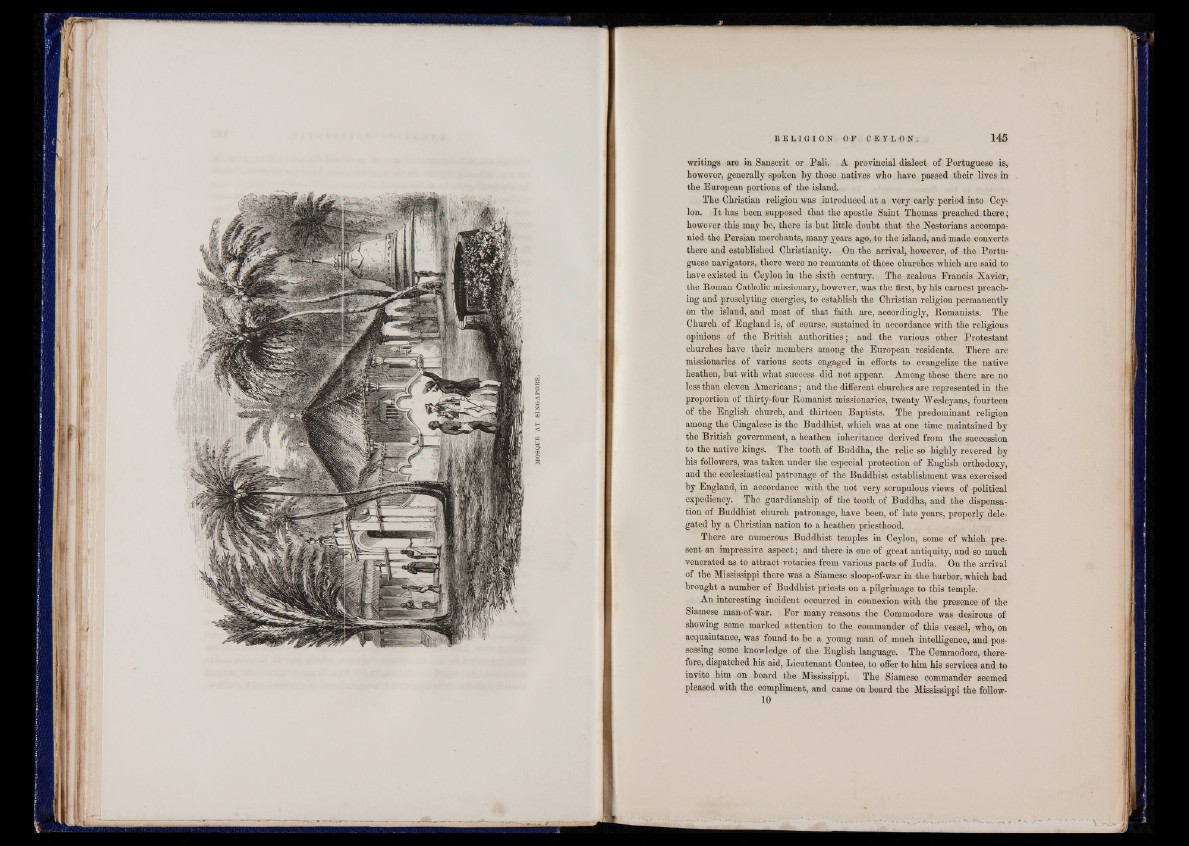
MOSQUE AT S IN G A PO R E .
writings are in Sanscrit or Pali. A provincial dialeot of Portuguese is,
however, generally spoken by those natives who have passed their lives in
the European portions of the island.
The Christian religion was introduced at a very early period into Ceylon.
I t has been supposed that the apostle Saint Thomas preached there;
however this may he, there is hut little doubt that the Nestorians accompanied
the Persian merohants, many years ago, to the island, and made converts
there and established Christianity. On the arrival, however, of the Portuguese
navigators, there were no remnants of those churches which are said to
have existed in Ceylon in the sixth century. The zealous Eranois Xavier,
the Roman Catholic missionary, however, was the first, by his earnest preaching
and proselyting energies, to establish the Christian religion permanently
on the island, and most of that faith are, accordingly, Romanists. The
Church of England is, of course, sustained in accordance with the religious
opinions of the British authorities; and the various other Protestant
churches have their members among the European residents. There are
missionaries of various sects engaged in efforts to evangelize the native
heathen, hut with what success did not appear. Among these there are no
less than eleven Americans; and the different churches are represented in the
proportion of thirty-four Romanist missionaries, twenty Wesleyans, fourteen
of the English church, and thirteen Baptists. The predominant religion
among the Cingalese is the Buddhist, which was at one time maintained by
the British government, a heathen inheritance derived from the succession
to the native kings. The tooth of Buddha, the relic so highly revered by
his followers, was taken under the especial protection of English orthodoxy,
and the ecclesiastical patronage of the Bnddhist establishment was exercised
by England, in accordance with the not very scrupulous views of political
expediency. The guardianship of the tooth of Buddha, and the dispensation
of Buddhist church patronage, have been, of late years, properly delegated
by a Christian nation to a heathen priesthood.
There are numerous Buddhist temples in Ceylon, some of which present
an impressive aspect j and there is one of great antiquity, and so much
venerated as to attract votaries from various parts of India. On the arrival
of the Mississippi there was a Siamese sloop-of-war in the harbor, which had
brought a number of Buddhist priests on a pilgrimage to this temple.
An interesting incident occurred in connexion with the presence of the
Siamese man-of-war. For many reasons the Commodore was desirous of
showing some marked attention to the commander of this vessel, who, on
acquaintance, was found to be a young man of. much intelligence, and possessing
some knowledge of the English language. The Commodore, therefore,
dispatched his aid, Lieutenant Contee, to offer to him his services and to
invite him on hoard the Mississippi. The Siamese commander seemed
pleased with the compliment, and came on board the Mississippi the follow